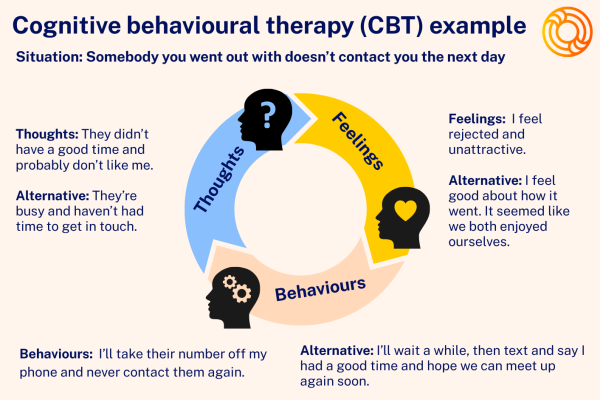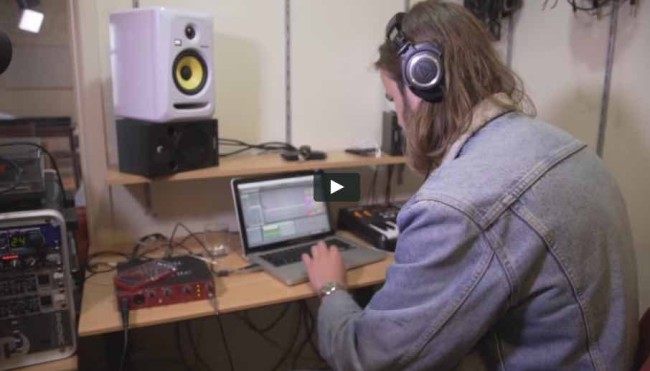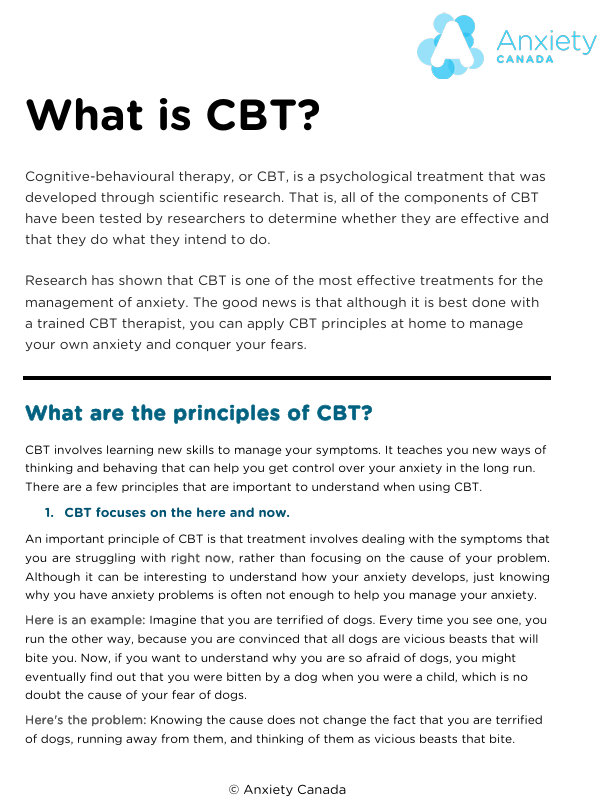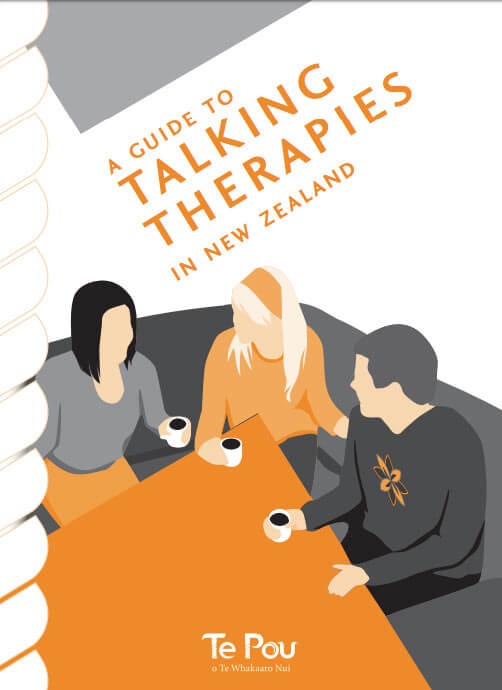If you're a frequent visitor to Healthify, why not share our site with a friend? Don't forget you can also browse Healthify without using your phone data.
Cognitive behavioural therapy (CBT)
Key points about cognitive behavioural therapy
- Cognitive behavioural therapy (CBT) is a talking therapy that aims to help you change your thinking in order to change your behaviour.
- CBT aims to help you to understand your thoughts and to think more positively about certain things.
- It can teach techniques for calming the emotional and physical arousal that happens when you’re feeling anxious or facing a difficult situation.
- With CBT you can learn skills to help you re-evaluate your immediate response to a situation and manage it with more strength and balance.

Cognitive behavioural therapy is one of the talking therapies available to treat mental health issues. The therapy can be broken down into 2 parts – cognition (what you think) and behaviour (what you do).
Because how you behave often depends on how you think, CBT aims to help you to understand your thoughts and to think more positively about certain things. Changing how you think can also change how you feel, act and relate to other people.
CBT focuses on your state of mind in the present and doesn’t necessarily focus on finding out the causes of your problems.
Video: What is Cognitive behavioural therapy? A short explainer
CBT works by breaking down your problem into smaller parts so that it's easier for you to make sense of how things are connected to each other and how they affect you. These smaller parts are:
- a situation – a problem, event or difficult situation
- thoughts or cognitions
- emotions
- physical feelings
- actions or behaviours.
Managing alertness in your body
When you’re feeling anxious, or facing a difficult situation, your body reacts and becomes more aroused or alert. You may have a faster heart and breathing rate and feel a surge of adrenalin or energy as your nervous system prepares for ‘fight or flight’. This can affect how you think, feel and act.
With CBT you can learn ways to control this state of arousal so you can think more clearly and objectively about what’s happening and how to respond. You can do this through mindfulness (being in the moment), relaxation techniques (such as breathing) and learning how to distance yourself from the ‘heat of the moment’.
You can also learn how to draw on resources you find helpful (such as positive memories, images or physical sensations) to cope with stressful situations and build resilience. Read more about building resilience(external link).
If you can learn to calm your mind and body, you can teach your nervous system how to return to a stable state. You can then focus on interrupting or changing the negative thoughts associated with a challenging situation and work out how to manage it better.
The CBT process in action
Here is an example of how CBT tools can help you reframe the thoughts, feelings and actions you have about a situation where you’re feeling anxious.

Image credit: Healthify He Puna Waiora
CBT has been shown to be helpful for a range of mental health conditions, eg, anxiety, depression, panic disorder, phobias, stress, bulimia, obsessive-compulsive disorder, post-traumatic stress disorder, bipolar disorder and psychosis. It can also help if you have problems with anger management, low self-esteem or chronic pain and fatigue.
A CBT session is clearly structured, and you work together with a therapist. The session focuses on current issues and practical solutions. You may have homework to do in between sessions to reflect on the outcomes of each session and to try new ways of thinking and doing things.
It generally starts with an update and a check on how you’re feeling. Your therapist will ask how you’ve been getting on since your last session and you’ll be encouraged to talk about any new situations or concerns. They'll give you feedback and make suggestions. You’ll be given things to work on as homework before the next session.
This homework is where you'll actively practice and apply the tools you are learning in the CBT sessions in your daily life. The therapist can help you understand your thinking and behaviour, but the strength in the CBT method lies in putting it into practice in real-life situations.
Video: Cognitive behavioural therapy – CBT
 (external link)
(external link)
(Werry Workforce, NZ, 2019)
Sessions are usually about an hour long and held weekly. Your therapist will personalise the therapy to match your specific needs. It can take 6 weeks to 6 months, depending on your issue and how you’re improving.
You can attend CBT sessions in person, online, or over the phone. A therapist can meet with you for one-on-one sessions or guide you through self-help resources and online programmes. You can also do CBT as part of a group with others who are dealing with a similar issue.
You can ask your healthcare provider to recommend someone or find a therapist(external link) yourself.
Beating the blues(external link) is the most widely used evidence-based online CBT (cognitive behavioural therapy) programme for relieving depression.
Just a thought(external link) Free online CBT and therapy for all New Zealanders. It has courses for anxiety, depression and COVID-related stress.
depression.org.nz(external link) is a New Zealand-based website that uses CBT-based online self-help programmes for depression and anxiety.
auntydee.co.nz(external link) is a CBT-based approach for wellbeing, anxiety and stress that has been adapted for Pasifika cultural groups by LeVa
SPARX(external link) is a New Zealand CBT-based online resource for young people.
Getselfhelp.co.uk(external link) is a useful UK site using a CBT approach.
The Centre for Clinical Interventions(external link) in Australia has CBT-based resources on a range of mental health topics.
Apps reviewed by Healthify
You may find it useful to look at some CBT apps and mental health and wellbeing apps.
Cognitive behavioural therapy(external link) Patient Info, UK
Cognitive behavioural therapy(external link) Royal College of Psychiatrists, UK
Cognitive behavioural therapy(external link) Mind UK
Brochures
Cognitive behavioural therapy (CBT)(external link) NHS, UK
What is CBT?(external link) Anxiety Canada
A guide to talking therapies in NZ [PDF, 564 KB] Te Pou, NZ, 2009
He rongoā kei te kōrero – talking therapies for Māori(external link) Te Pou, NZ, 2010
Talking therapies for Asian people [PDF, 3.1 MB] Te Pou NZ, 2010
Talking therapies for Pasifika peoples [PDF, 3.1 MB] Te Pou NZ, 2010
Apps
CBT apps
Mental health and wellbeing apps
References
- Nakagawa A, Sado M, Mitsuda D, Fujisawa D, Kikuchi T, Abe T, Ono, Y. Effectiveness of cognitive behavioural therapy augmentation in major depression treatment (ECAM study) – study protocol for a randomised clinical trial(external link) BMJ Open, 2014;4(10), e006359
- Iacobucci, G. CBT is effective for treating patients with health anxiety, study shows(external link) BMJ 2017;358, j4177
- David D, Cristea I, Hofmann, SG. Why cognitive behavioral therapy is the current gold standard of psychotherapy(external link) Front Psychiatry 2018;9(4)
- Hofmann SG, Asnaani A, Vonk IJ, et al. The efficacy of cognitive behavioral therapy – a review of meta-analyses(external link) Cognitive Therapy and Research 2012;36(5), 427–440
- Chand SP, Kuckel DP, Huecker MR. Cognitive behavior therapy(external link) StatsPearls, NIH, US, 2023
- Emotional regulation – 5 evidence-based regulation techniques(external link) Positive Psychology, The Netherlands, 2025
- Therapeutic healing with resourcing techniques(external link) Your Wellbeing Matters, UK
- Cognitive behaviour therapy(external link) National Library of Medicine, US
Luo C, Sanger N, Singhal N, et al. A comparison of electronically-delivered and face to face cognitive behavioural therapies in depressive disorders – a systematic review and meta-analysis(external link). EClinicalMedicine 2020;24:100442.
The key principles of cognitive behavioural therapy(external link) InnovAiT 2013;6(9):579–585
Nakagawa A, Sado M, Mitsuda D, Fujisawa D, Kikuchi T, Abe T, Ono, Y. Effectiveness of cognitive behavioural therapy augmentation in major depression treatment (ECAM study) – study protocol for a randomised clinical trial(external link) BMJ Open, 2014;4(10), e006359.
Iacobucci, G. CBT is effective for treating patients with health anxiety, study shows(external link) BMJ 2017;358, j4177.
David D, Cristea I, Hofmann, SG. Why cognitive behavioral therapy is the current gold standard of psychotherapy(external link) Frontiers in Psychiatry 2018;9(4).
Hofmann SG, Asnaani A, Vonk IJ, Sawyer AT, & Fang, A. The efficacy of cognitive behavioral therapy – a review of meta-analyses(external link) Cognitive Therapy and Research 2012;36(5), 427-440
Kuut TA, Müller F, Csorba I, et al. Efficacy of cognitive-behavioral Therapy targeting severe fatigue following coronavirus disease 2019 – results of a randomized controlled trial. Clin Infect Dis. 2023 Sep 11;77(5):687–695
Brochures

Anxiety Canada

Te Pou, NZ, 2009
Credits: Healthify editorial team. Healthify is brought to you by Health Navigator Charitable Trust.
Reviewed by: Juanita Harrison, Clinical Psychologist and Certified Life Coach, Auckland
Last reviewed:






